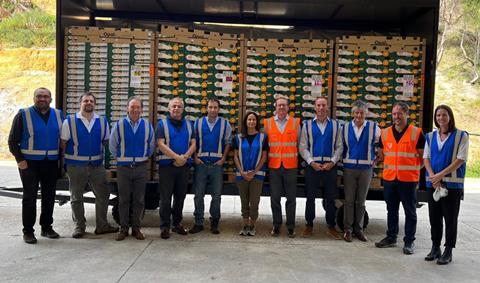Visit by Chilean trade delegation to New Zealand signals thawing in long-running kiwifruit trade dispute
A Chilean trade mission led by Asoex president Iván Marambio visited New Zealand this month to learn more about its fruit production and export processes and forge a closer collaboration between the two industries. The trip marks a significant step in moves to end in ending Chile’s long-running spat with New Zealand’s kiwifruit industry, which has accused of monopolistic practices.

During the visit, Asoex visited kiwifruit and apple and pear orchards and packhouses, as well as research and pest control centres. Meetings were held with executives from Zespri, New Zealand Kiwifruit Growers Incorporated (NZKGI), Plant & Food Research, New Zealand Apples and Pears, T&G and Mr Apple.
Signalling the potential for cooperation between the two countries’ respective kiwifruit sectors, Marambio said: “Although we compete, there are instances in which we can work together, such as in promoting kiwifruit consumption…as well as quality, conditions and new varieties”.
The two sectors have agreed to come up with a joint working plan before the next meeting of the International Kiwifruit Organisation, which will take place later this year in Chile.
In addition to Marambio, the Chilean delegation was made up of Carlos Cruzat, president of the Chilean Kiwifruit Committee, Charif Christian Carvajal, Asoex’s marketing director for the Asian and Middle Eastern markets, as well as representatives of five Chilean fruit exporting companies.
Cruzat said the visit had been very positive and raised interesting opportunities for cooperation, “not only to promote greater consumption of the fruit, but also, for example, in facing climate change that affects both industries, as well as pest prevention and control”.
Carvajal, a former president of the Southern Hemisphere Association for Fresh Fruit Exporters (Shaffe), commented: “From Shaffe’s point of view, this visit was very important, since both countries are Shaffe members, and for this reason, we value the instances that can promote the exchange of information at a technical-productive level; but also because it allows both industries to visualise at what level each one is, according to the category of products, which in this case focused on apples, pears and kiwifruit.
“We believe that there was learning from both parties, generating very positive instances of exchange, with a very good willingness to continue working and cooperating in the future.”
New Zealand is the world’s biggest kiwifruit exporter, the fruit accounting for 63 per cent of overall fruit exports. Shipments grew 45 per cent between 2017 and 2021, rising from 521,247 tonnes to 753,337 tonnes.
Over the same time period, fruit exports grew 27 per cent from 942,952 tonnes to 1.2m tonnes. In addition to kiwifruit, apples, pears and avocados account for the bulk of fruit exports.
Chile, meanwhile, mantains its position as the Southern Hemisphere’s leading supplier of fresh fruit, with apples, table grapes, cherries, kiwifruit and citrus at the top of its export league table. Between 2017 and 2021 exports grew 5 per cent from 2.923m tonnes to 3.056m tonnes.



